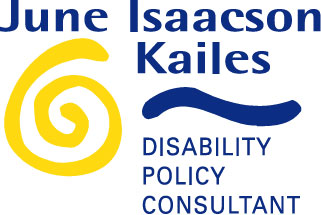
Health
Experience
June
has over four decades of health care experience. Her work
offers clarity, precision, and specificity in building inclusive
planning and
service practice competencies. Examples of her impact, influence, and
work
includes:
- Developing
inclusive accommodations that fill service
gaps, prevent civil rights violations, and
emphasize and incorporate standard operating procedures and
just-in-time checklists.
- Training
that goes beyond disability etiquette, sensitivity and awareness by
focusing on maximizing impact and measurable skill sets. This training
emphasizes building and infusing critical, actionable competencies
into practices, programs, policies, procedures, protocols, processes,
training, and audits. These
trainings result in improved physical, equipment, programmatic, and
communication access that increases competent care and improves health.
These results also decrease barriers, appointment failures, unequal
treatment, and health disparities.
- Producing tools
to help individuals with disabilities get the most out of their visits
with health care providers. Peer mentors, counselors, patient
educators, health care navigators, coaches, case managers, care
coordinators, service coordinators, social workers, and health care
providers also use these tools. This material incorporates the
specific realities of living with disability and functional needs. General
information regarding seeking and getting effective health care is
important for everyone, but information for the general population
is not always equally applicable and usable by people with
disabilities. Attending to details is a needed survival skill when
living with functional needs. This detail can be missing when
materials are produced “for and about” instead “of, with and by,”
people with disabilities. Examples of these materials are listed
below.
- ·Identifying and
documenting,as far back as the 1990s,
that aging with disability issues are not limited to people
experiencing
post-polio syndrome but are shared by many who live long term with
disability.
This real potential threat of a “cascading” or “house of cards
effect”
related to functional loss and thus loss of independence needed
attention.
These effects include but are not limited to increasing arthritis and
pain,
deteriorating balance, walking, the threat of falls or injuries, loss
of
ability to exercise, as well as common
age-related
changes that everyone experiences. These changes can potentially
threaten the
ability to operate mobility devices safely. June continues to advocate
for
essential interventions in the form of periodic assessments that
incorporate
specific exercises and the use of technology.
- Originating
and working with California
And Medi-Cal health plans
to require Physical Accessibility Review Survey (PARS) assessments
for primary care provider sites, high volume specialists, Community
Based Adult Services, and high volume ancillary services. Trained
surveyors conduct these assessments. Data gathered from these surveys
helps people with mobility disabilities to use the information to
select accessible health care providers that meet their accessibility
needs. Accurate survey information addressed the critical
and long-standing problem of accessibility information not being
available. Members with disabilities had the burden of calling every
available provider to determine whether the provider could meet their
accessibility needs. All too often, members were given incorrect
information by well-meaning but misinformed and untrained
staff. Inaccurate information resulted in failed
appointments for members and decreased their access to health care
services.
California
Medi-Cal Provider Site Review Tools:
Other states are
adopting versions of this model ad tools.
Examples of her
frequently used and cited materials include:
- (2006)
The Patient’s Perspective on Access to Medical Equipment. In J. Winters
and M. Story (Ed.), Medical Instrumentation: Accessibility and
Usability Considerations (pp. 3-14). Boca Raton, FL: CRC Press,
- (2006) Making
Preventive Health Care Work for You – A Resource Guide for People with
Physical Disabilities,
- (2008) 5 “G’s”
Getting Access to Health Care for People with Physical Disabilities,
- (2012) Effectively
Including People with Disabilities in Policy and Advisory Groups
- (2015) Accessible
Meetings, Events, and Conferences, A Guide to Planning Accessible
Meetings. The
Mid-Atlantic ADA Center and TransCen Inc.
- (2017) Transfer
Assistance For People with Mobility and Disability Limitations On And
Off an Exam Table, 4.2
minutes, J.I. Kailes script for Inland
Empire Health Plan
- (2017) Using
Accessible Scales to Weigh People with Mobility and Disability
Limitations, 4 minutes,
J.I. Kailes script for Inland
Empire Health Plan
- (2021) Health Plan
Member-Focused Emergency Practices Roadmap

Available on
request
CV / Resume
which includes updates for:





 jik@pacbell.net
jik@pacbell.net